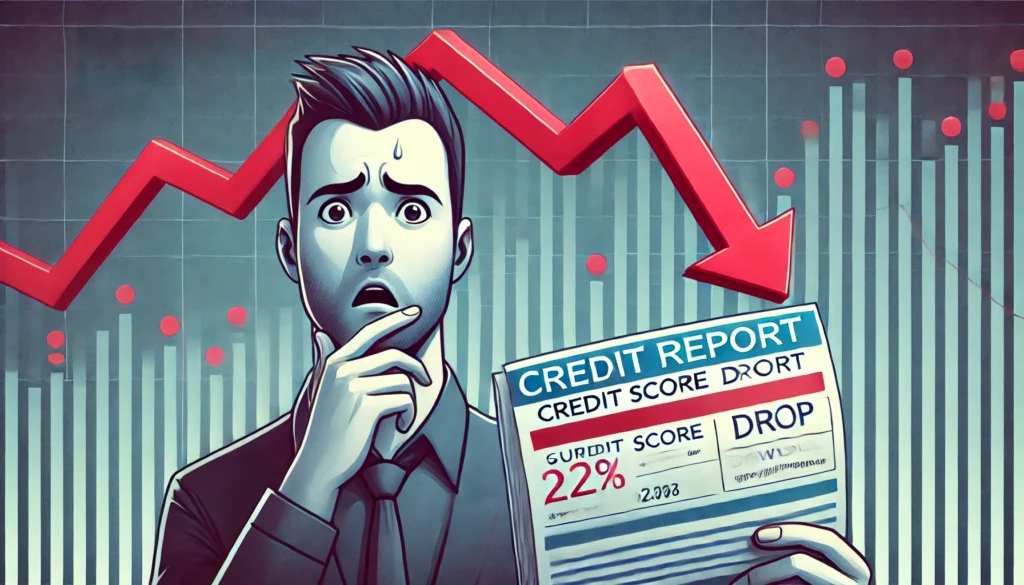Credit scores are like the financial pulse of our lives, influencing everything from loan approvals to job opportunities.
But what happens when your credit score drops unexpectedly? This can be confusing and frustrating, especially when you believe you’ve been managing your credit responsibly.
Normally, credit score drops suddenly mainly due to the following reasons:
- Errors in Credit Report
- Changes in credit utilization
- Closing any accounts
- Making payments overdue
- Generating hard inquiries
- Not maintaining diverse credit portfolio
This article will explore the reasons behind these sudden drops and provide actionable insights to help you maintain a healthy credit score.

Are There Errors in Your Credit Report?
Sometimes, credit scores plummet due to errors in your credit report. Imagine applying for a mortgage and discovering that your credit score is lower than expected because of a mistake.
According to a 2013 study by the FTC, one in five consumers had an error on at least one of their three credit reports.
Errors may occur mainly due to:
- Typographical errors such as such as misspelled names, incorrect addresses, or wrong Social Security numbers, can lead to incorrect information being recorded.
- If someone fraudulently uses your identity to open accounts, the resultant activity can be reported on your credit file.
- Outdated information such as paid-off debts or closed accounts.
- Incorrectly shown balances due to creditor reporting errors.
- If there is any duplicate accounts.
These credit report errors range from incorrect personal information to inaccurate account statuses. Reviewing your credit reports from the three major bureaus—Equifax, Experian, and TransUnion—can help you spot and correct these mistakes.
Have you ever found an error in your credit report? Correcting it promptly can save you from unnecessary score drops.
How Does Your Credit Utilization Affect Your Score?
Credit utilization is a significant factor in credit scoring models. It represents the ratio of your credit card balances to your credit limits.
A sudden increase in credit card balances can cause a noticeable drop in your score. For example, if your credit limit is $10,000 and your balance jumps from $2,000 to $5,000, your utilization rate spikes from 20% to 50%.
This spike can lead to a lower credit score. How often do you check your credit card balances? Keeping your utilization below 30% is generally recommended to maintain a good score. You can calculate your debt-to-income ratio to check your current situation.
Have You Recently Closed an Account?
Closing a credit account can impact your credit score in two ways: by reducing your available credit and by shortening your credit history.
Suppose you close an old credit card account with a high limit. This action reduces your overall credit limit, increasing your credit utilization ratio.
Additionally, the age of your accounts contributes to your credit score, and closing an older account can shorten your average account age.
Before closing any account, consider how it might affect your overall credit picture.
Did You Miss a Payment or Have a Late Payment?
Payment history is the most crucial factor in your credit score, making up 35% of the total. A single missed or late payment can significantly impact your score.
For instance, a late payment can drop your score by 90 to 110 points. Consistently paying your bills on time is essential to maintain a healthy credit score.
Have you ever missed a payment due to an oversight?
Setting up automatic payments or reminders can help prevent this from happening. Use our debt management guide to plan your loan payment to maintain the score healthy.
How Do Hard Inquiries Impact Your Score?
Applying for new credit results in hard inquiries, which can temporarily lower your credit score. Each hard inquiry might reduce your score by five to ten points.
However, if you apply for multiple credit cards or loans within a short period, the impact can be more substantial.
When you are rate shopping for a mortgage or auto loan, multiple inquiries within a short time frame are usually counted as a single inquiry by scoring models like FICO.
Are you planning to apply for new credit soon? Limiting the number of applications can help preserve your score.
What About Changes in Your Credit Mix?
Your credit mix, or the variety of credit accounts you have, accounts for 10% of your credit score. If you recently paid off and closed a loan, your credit mix changes, potentially impacting your score.
A diverse range of credit types, such as credit cards, mortgages, and installment loans, can positively influence your score.
How diverse is your credit portfolio? Maintaining a mix of credit types can contribute to a healthier credit score.
Here’s an example of how a well-balanced credit mix improves the health of your credit score:
For instance, if you have a combination of a mortgage, an auto loan, and a few credit cards, this diversity shows lenders that you can handle both revolving and installment credit effectively.
A balanced mix like this can contribute to about 10% of your overall credit score, highlighting your financial stability and creditworthiness to potential lenders.
How Can Monitoring Your Credit Help Prevent Surprises?
Regular credit monitoring is crucial for staying on top of your financial health. Credit monitoring services can alert you to changes in your credit report, helping you address issues promptly.
By understanding the factors that influence your credit score, you can make informed decisions to maintain and improve it.
Have you signed up for a credit monitoring service?
Proactively managing your credit can help you avoid unexpected drops and keep your score in good shape.
How can you improve your score, if drops suddenly?
These are some useful strategies that can help you improve your credit score. Apply them if you see them and suddenly drop off your score.
- Dispute inaccurate information by obtaining a free copy of your credit report from the three major credit bureaus (Equifax, Experian, and TransUnion)
- Pay down high credit card balances or, split credit card balances in different cards. It will improve your credit utilization score.
- Set up automatic payments to ensure timely payments
- Request for a credit line increase or enlarge your credit card limit
- Consider having a mix of revolving credit (like credit cards) and installment loans (like auto loans or mortgages).
- Address past-due accounts.
You can read our credit score improvement guide here.
Conclusion
Credit scores can fluctuate for various reasons, often leaving consumers puzzled. By understanding the potential causes, such as errors in your credit report, changes in credit utilization, closing accounts, missed payments, hard inquiries, and shifts in your credit mix, you can take proactive steps to manage your credit health.
Regular monitoring and timely actions are key to maintaining a robust credit profile. Have you experienced an unexpected credit score drop? Understanding these factors can help you navigate and correct the situation effectively.




